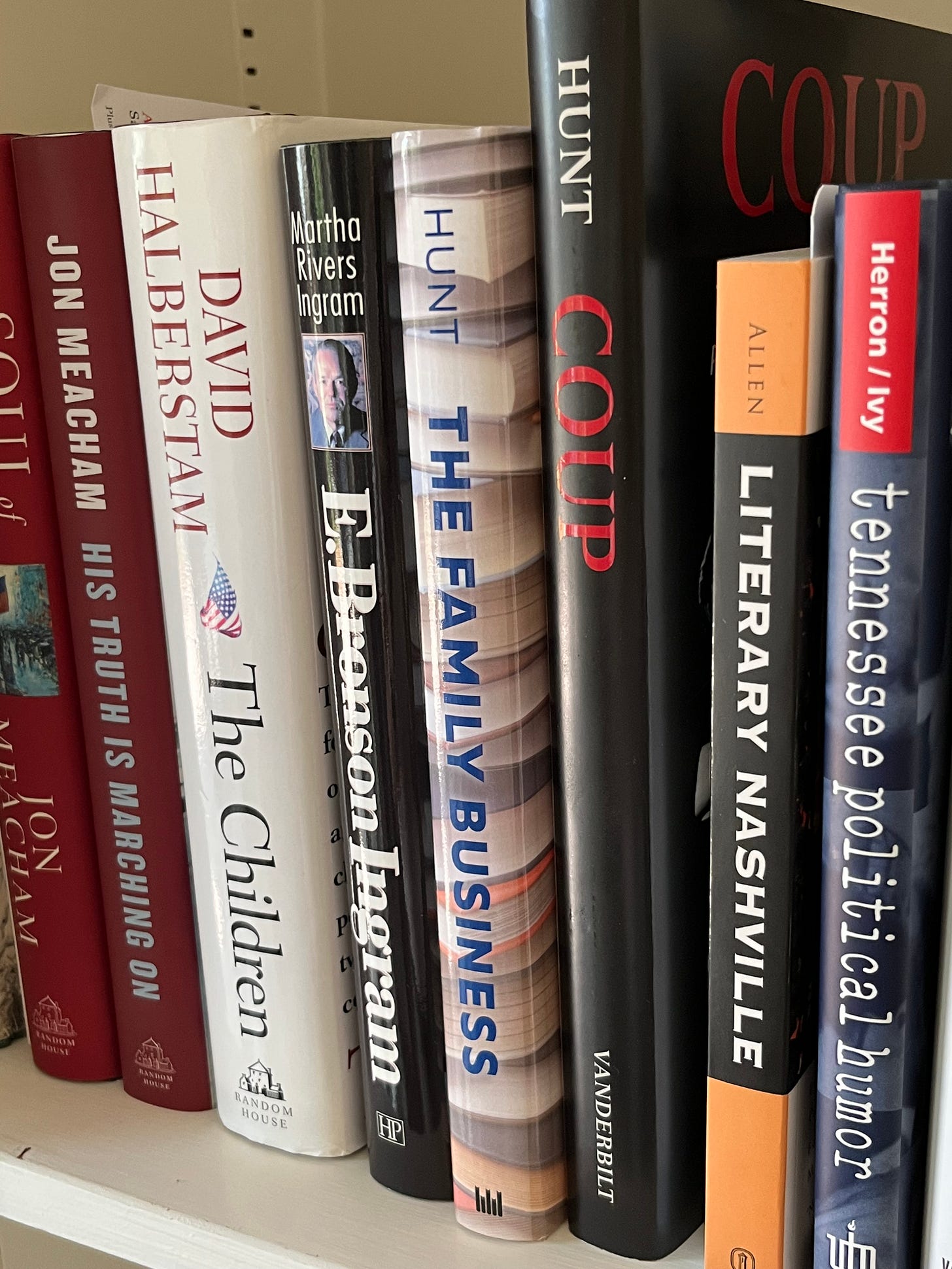Two weeks ago I met a group called the Nashville History Club, folks who enjoy learning about and discussing many aspects of the city’s past. The club meets, appropriately, in the new visitor center at Fort Negley, a place on the south side of downtown with plenty of its own important history.
Jean Roseman had kindly invited me to come speak some months ago, but for various reasons (my travel plans, a new book project that I needed to finish) the event could not happen until the last day of May. By that point, rather than talking about one of my own books, I decided to speak more broadly on a new topic for me: “Nashville’s Nonfiction Tradition.” As it turned out, this stirred up some lively conversations in the room that day.
My view is that Nashville, over the past century, has been somewhat unique among most US cities owing to a happy collision of three factors: Higher education, newspapers, and a robust publishing industry.
1. Nashville’s concentration of colleges and universities has had many positive effects on the city. A big one has been to create a magnet for scholars who are writers of history, sociology, and other disciplines.
2. Nashville’s long tradition of newspaper journalism made the city a draw for talented reporters who liked to tell important stories. They worked here in both the news and sports departments. Back in the day, Grantland Rice was one of these, and arriving later on were Jeff Pearlman, Andrew Maraniss, and ESPN’s Buster Olney. (The historian Jon Meacham, now affiliated with VU, began his career as a reporter in Chattanooga.)
3. The technological infrastructure for publishing and printing that also developed here meant that as a writer you had at least a shot at getting your book published.
For the History Club meeting, I took a list of a couple dozen books (see below) that, for one reason or other, have appealed to me personally. All are nonfiction - not poetry or drama or novels, though Nashville has generated many in these forms, too.
My list shows a variety of topics and authors, and I admit it’s subjective. Some involve events that occurred in Nashville (the lunch-counter sit-ins, the disruption of urban renewal) or work by local writers, or in a few of these examples a book that itself became famous had a more general association with the city. Some are new; a couple are very old. In one or two cases, the Nashville connection may seem a stretch, but it’s there…
The Souls of Black Folk. By W.E.B. DuBois. His undergraduate years at Fisk University gave Nashville a proud claim to having a part in the early development of this important intellectual.
I’ll Take My Stand: The South and the Agrarian Tradition. By 12 Southerners. They were all connected to Vanderbilt, including Allen Tate, Robert Penn Warren, and Donald Davidson (who also was the editor of the Tennessean’s first book page in the 1920s).
A Search for Justice. By John Seigenthaler, and contributors James Squires, John Hemphill, and Frank Ritter.
Nathan Bedford Forrest: A Biography. By Jack Hurst (He was a reporter at The Tennessean before he became a Civil War historian).
I’ll Take You There: Exploring Nashville’s Social Justice Sites. Jamie Thurber and Learotha Williams Jr.
Temple’s Tigerbelles. By Dwight Lewis and Susan Thomas. About the legendary track coach at TSU and the Olympians he trained here.
The Civil Rights Movement in Tennessee: A Narrative History. By Bobby Lovett.
Nashville: The Faces of Two Centuries, 1780-1980; A Mind To Stay Here: Profiles from the South and Speak Now Against the Day, and The Americanization of Dixie: The Southernization of America and Speak Now Against the Day. All by John Egerton.
Yesterday’s Nashville. By Carl F. Zibart.
Nashville Streets and Their Stories and The Hermitage at 100. Two of many by my prolific friend Ridley Wills II.
Dynamite! 75 Years of Vanderbilt Basketball. By Roy M. Neel. (A Vandy grad who became a sportswriter at the Nashville Banner.)
Strong Inside. By Andrew Maraniss
The Children. By David Halberstam.
Earth in the Balance: Ecology and the Human Spirit and An Inconvenient Truth: The Crisis of Global Warming. Both by Al Gore.
The Secrets of the Hopewell Box. By James D. Squires.
FBI Codename TENNPAR: Tennessee’s Ray Blanton Years. By Hank Hillin.
COUP: The Day the Democrats Ousted Their Governor. By Keel Hunt.
Fortunes, Fiddles & Fried Chicken: A Nashville Business History. By Bill Carey.
Graceland, At Last and Late Migrations. Two by Margaret Renkl
His Truth is Marching On: John Lewis and the Power of Hope. By Jon Meacham.
Hot, Hot Chicken: A Nashville Story. By Rachel Louise Martin. (A scholar’s blend of food history with urban renewal’s record here.)
Brother to a Dragonfly. By Will Campbell.
These Precious Days: Essays. By Ann Patchett. (You know her principally as a novelist, but her latest collection of essays demonstrates her considerable chops as a writer of nonfiction.)
A Long Path: The Search for a Tennessee Bicentennial Landmark. By Kem G. Hinton.
Apollo’s Struggle: A Performing Arts Odyssey in the Athens of the South. By Martha Rivers Ingram with D.B. Kellogg.
Daughter of the Air: The Brief Soaring Life of Cornelia Fort. By Rob Simbeck
Hot Spot: A Doctor’s Diary from the Pandemic. By Alex Jahangir. For some more recent Nashville history.
I recommend them all. But what other titles - new or old - would you add to this list?





The secrets of the Hopewell box
How about "Strong Inside", by Andrew Maraniss?